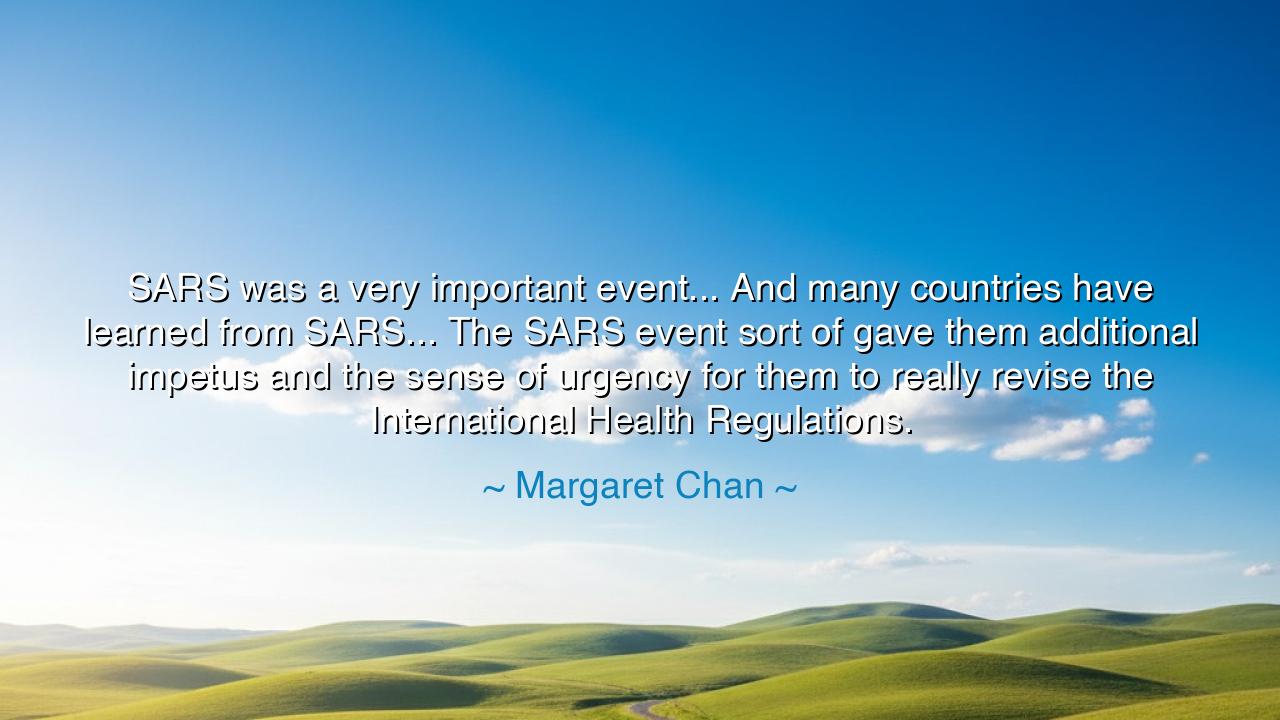
SARS was a very important event... And many countries have
SARS was a very important event... And many countries have learned from SARS... The SARS event sort of gave them additional impetus and the sense of urgency for them to really revise the International Health Regulations.






The words of Margaret Chan — “SARS was a very important event... And many countries have learned from SARS... The SARS event sort of gave them additional impetus and the sense of urgency for them to really revise the International Health Regulations.” — are not spoken in haste, but with the solemn weight of history. Behind them echoes the memory of fear, loss, and awakening — for SARS, the Severe Acute Respiratory Syndrome of 2003, was more than a disease; it was a mirror held up to humanity. It revealed both our fragility and our capacity to learn, both our divisions and our unity in crisis. Chan’s words remind us that from suffering must come renewal, and from chaos, the wisdom to build stronger foundations for the generations to come.
In the long scroll of human history, plagues have always been the great teachers of humility. The Black Death in the 14th century shattered feudalism and forced Europe to rebuild its society. The 1918 influenza taught nations that disease respects no border, no empire, no flag. And so too did SARS, centuries later, remind the modern world — so proud of its science and technology — that one invisible enemy can bring entire nations to stillness. Margaret Chan, then Director-General of the World Health Organization, saw in this event the same ancient lesson: that health is not a local matter but a global covenant, and that vigilance must never sleep.
The origin of her words lies in the aftermath of that storm. When SARS spread from southern China to more than two dozen countries, the world trembled. Cities fell silent, economies wavered, and fear traveled faster than the virus itself. Yet amid that darkness, something sacred happened — nations began to speak to one another, scientists shared knowledge freely, and humanity glimpsed its shared destiny. From this crucible emerged the resolve to revise the International Health Regulations, a framework through which nations could share information swiftly, act decisively, and protect all people — not just their own. In this, Chan saw the triumph of understanding over pride, of collaboration over isolation.
The lesson of SARS, as Chan reminds us, is that wisdom often comes at the cost of suffering. Just as fire tempers steel, so do crises forge better systems, stronger minds, and humbler hearts. In ancient China, after great floods or famines, emperors would erect monuments not to their victories but to their lessons — inscriptions that said, in essence, “Never again.” So too did the world, under Chan’s guidance, inscribe its vow into the laws of global health. The new regulations became humanity’s written promise: that when the next disease arose, we would not face it with arrogance or delay, but with unity and swiftness born of memory.
Yet, even as this wisdom was gained, Chan’s tone carries both hope and warning. For she knew that memory fades and complacency returns. The urgency that burns during crisis cools with time. This, too, is an old pattern. After the plague of Athens, men built temples to the gods in gratitude, but within a generation, they forgot their prayers. So Chan’s words are not merely a reflection on the past — they are a call to remain vigilant, to keep learning even in times of peace. For the enemy of preparedness is forgetfulness, and those who forget their past suffer it again in new form.
Consider how this truth echoed when COVID-19 struck nearly two decades later. The systems built after SARS became the foundation for the global response — yet even then, cracks appeared where lessons had been neglected. Some nations acted swiftly, others faltered. The same urgency Chan once praised was rediscovered painfully. Her prophecy, unspoken yet present, was fulfilled: the world must learn not once, but continually. Health security must be living knowledge, not a relic of crisis.
So, my children of the present and future, heed this wisdom. Do not wait for suffering to awaken your sense of duty. Let the memory of past trials guide your steps. In your communities, in your nations, and in your hearts, cultivate the spirit of preparedness, cooperation, and humility. Share knowledge as freely as light, and protect life with the same care you give your own. For in every outbreak, every storm, and every test of humanity, the greatest cure lies not in medicine alone, but in wisdom, compassion, and remembrance.
Thus, the words of Margaret Chan endure as both testament and teaching: that through each crisis, mankind is given a chance to rise wiser than before. Let us not waste the pain of the past, but transform it into strength for the future. For only those who learn from calamity can build an age of lasting health — where vigilance is peace, and where every nation stands not apart, but together, as one body, healed and whole.






AAdministratorAdministrator
Welcome, honored guests. Please leave a comment, we will respond soon